Evaluating the Anti-Defection Law: Addressing Complexities and Suggesting Reforms
Is the Anti-Defection Law Adequate? Responding to Manish Tewari's Article for Addressing Complexities, Proposing Reform Measures, and Tackling the Persistent Challenge of "Aya Ram Gaya Ram" Culture.
In a recent article titled "Does the anti-defection law silence the voice of democracy?" published in "The Asian Age," Mr. Manish Tewari, a Member of Parliament from Punjab, addresses the flaws and shortcomings of the anti-defection law in India1. Mr Tewari criticizes the law for its inability to effectively curb political defections and its detrimental impact on the freedom of speech and expression of elected representatives. He argues that these deficiencies undermine the core principles of democracy and parliamentary democracy enshrined in the Indian Constitution.
The article concludes by stating that recent events in Maharashtra, Goa, and other places highlight the need to reevaluate the role and nature of the exalted individuals who occupy constitutional positions of power in legislative institutions. Mr Tewari argues that the 10th Schedule should be repealed and replaced with a more effective mechanism to address defections while preserving the essence of democracy in India's legislative institutions.
1. Mr Tewari's Arguments: Mr Manish Tewari's article raises several key points regarding the shortcomings of the anti-defection law in India. He emphasizes that the law has failed to effectively prevent political defections and has encroached upon the freedom of speech and expression of elected representatives. He asserts the need for comprehensive reforms to strike a balance between the interests of elected representatives and political parties.
2. Critiquing the Argument for "Quiet Resignation": While Mr Tewari acknowledges the existence of "quiet resignations," where elected candidates disregard party directions but retain their seats, it is important to critically examine this practice. Such behavior raises ethical concerns as it undermines the trust placed in elected representatives by their constituents. Outright resignation in such cases would perhaps promote accountability and uphold democratic principles.
3. The Supreme Court's Role and Limitations: The Supreme Court's role in relation to the anti-defection law is limited to interpreting the law and settling disputes. It is unable to address questions of ethics and electoral morality, as these matters fall within the purview of the electorate. The responsibility to pass judgment on the actions of elected representatives lies with the people through the electoral process.
4. Impartiality Challenges for the Speaker and Judicial Review: The Speaker, elected by the majority party in the Lok Sabha or the Vidhan Sabha, cannot be nonpartisan, by definition— at least he is not widely perceived to be so. Consequently, the Speaker cannot, in our humble opinion serve as the ultimate authority in disputes related to defection and disqualification, particularly since there is no specified time limit within which the Speaker must deliver a verdict. At least there must be explicit checks and balances incorporated into the law. Additionally, the limited scope of judicial review makes the Supreme Court generally hesitant to intervene in the Speaker's decisions or interim orders.
5. Dilemmas Surrounding Floor Tests and Voting: The situation becomes more complex when the President or Governor calls for a floor test while disqualification cases are pending with the Speaker. This scenario raises crucial questions concerning the participation and treatment of votes from members facing disqualification. Should these members be allowed to vote? Should their votes be sealed? Moreover, the method of voting itself raises additional considerations—should it be open, by show of hands, or through a secret ballot? These unanswered questions hold immense political, electoral, and constitutional implications that require careful examination and resolution.
6. Ambiguities Regarding the Election Commission: While the Speaker is responsible for disqualifying individual members or groups, the recognition of party splits, registration of successor parties, and determination of their names and allotment of symbols fall within the Election Commission's jurisdiction. Clear guidelines and clarifications are necessary to address these critical aspects under the law.
7. Gray Areas of Disqualification: There may be instances where disqualification is triggered even before a member categorically defies the party whip on the floor of the house, such as public criticism of the party high command. The present legal provisions are ambiguous and such cases require further examination to frame codified laws and provide clarity on the matter.
The Broader Question of Parliamentary Democracy: The broader question at hand pertains to parliamentary democracy and the preservation of the "basic features or structure of the constitution", as defined in the landmark case of Kesavananda Bharti vs Union of India. It is crucial to recognize that MPs and MLAs are elected by the people, and therefore, they cannot completely disregard the sentiments of their constituents. They should not become mere puppets or hostages in the hands of party whips, as it undermines the essence of representative democracy. This matter necessitates a comprehensive discussion and debate involving all stakeholders to ensure the democratic principles and rights of the electorate are not arbitrarily trampled.
Maharashtra Vidhan Bhavan
Enhancing the Role of the Speaker and Ensuring Fairness: Reforms should aim to enhance the fairness and impartiality of the Speaker, whether of the Lok Sabha or the State Vidhan Sabhas. Proposed measures may include introducing time-bound processes, conducting public hearings, and making orders appealable directly to the Supreme Court, including in cases involving the Speaker of a State Vidhan Sabha. This will automatically exclude the writ jurisdiction of the High Courts, since the remedy lies directly before the Apex Court.
Summing up: The issue of defections remains a critical concern within India's parliamentary democracy, encompassing various moral, ethical, electoral, legal, and constitutional dimensions. The Parliament has grappled with this challenge since 1985, but the success in addressing it has been limited. In some cases, attempted remedies have even given rise to new problems.
Way forward through consensus-building: The recent incidents in Maharashtra and Goa serve as stark reminders of the urgent need for further reforms. Achieving meaningful progress necessitates a consensus-driven approach through broad-based consultations involving all stakeholders. The sooner such reforms are undertaken, the stronger our democracy will become. While it may be doubtful whether comprehensive changes can be implemented before the 2024 Lok Sabha elections, it is crucial that enlightened Members of Parliament, such as Mr. Manish Tewari, publish detailed discussion papers on the multifaceted issues at hand, highlighting the pros and cons of various approaches.
Mr Manish Tewari, Lok Sabha MP from Anandpur Sahib constituency in Punjab, visits the flood-affected areas (pic off his twitter handle: 13th July, 2023).
While newspaper articles can stimulate initial discussions, they cannot replace the comprehensive insights provided by a well-crafted document. A detailed and thorough examination of the subject matter is essential to catalyze informed deliberations and facilitate meaningful progress on this critical issue.


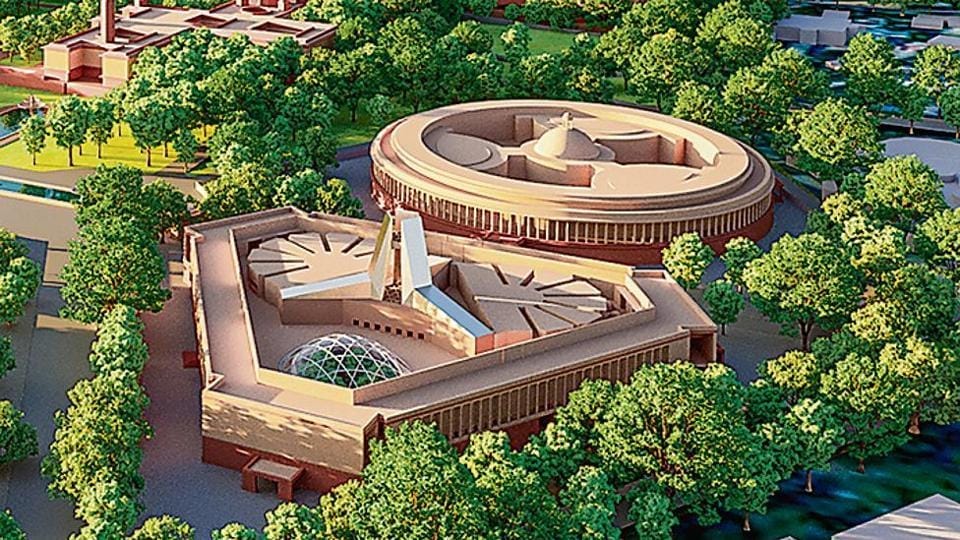
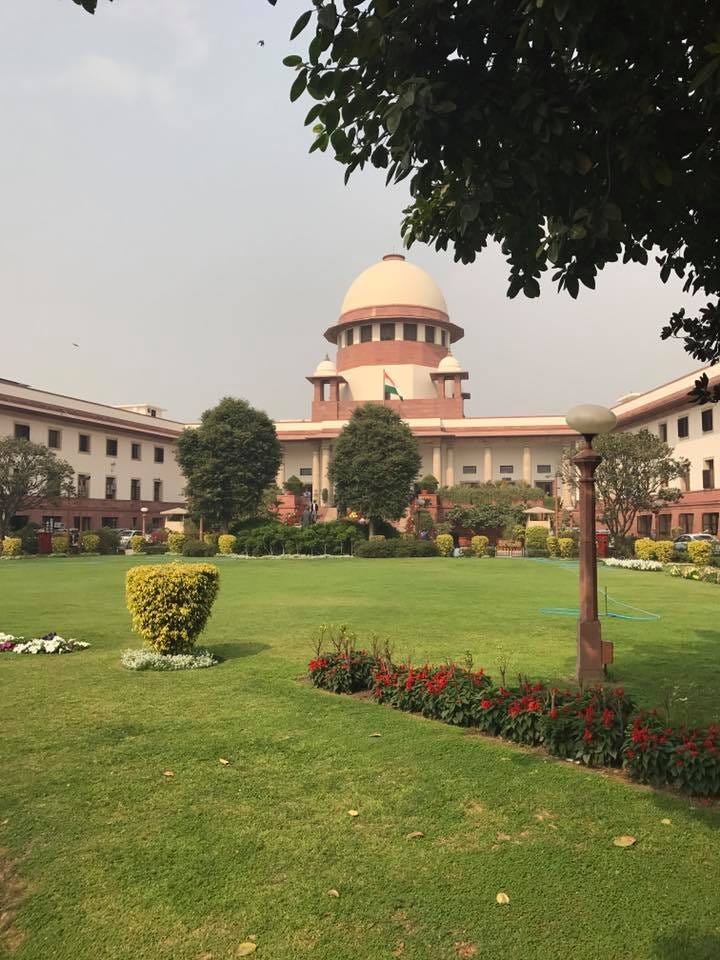

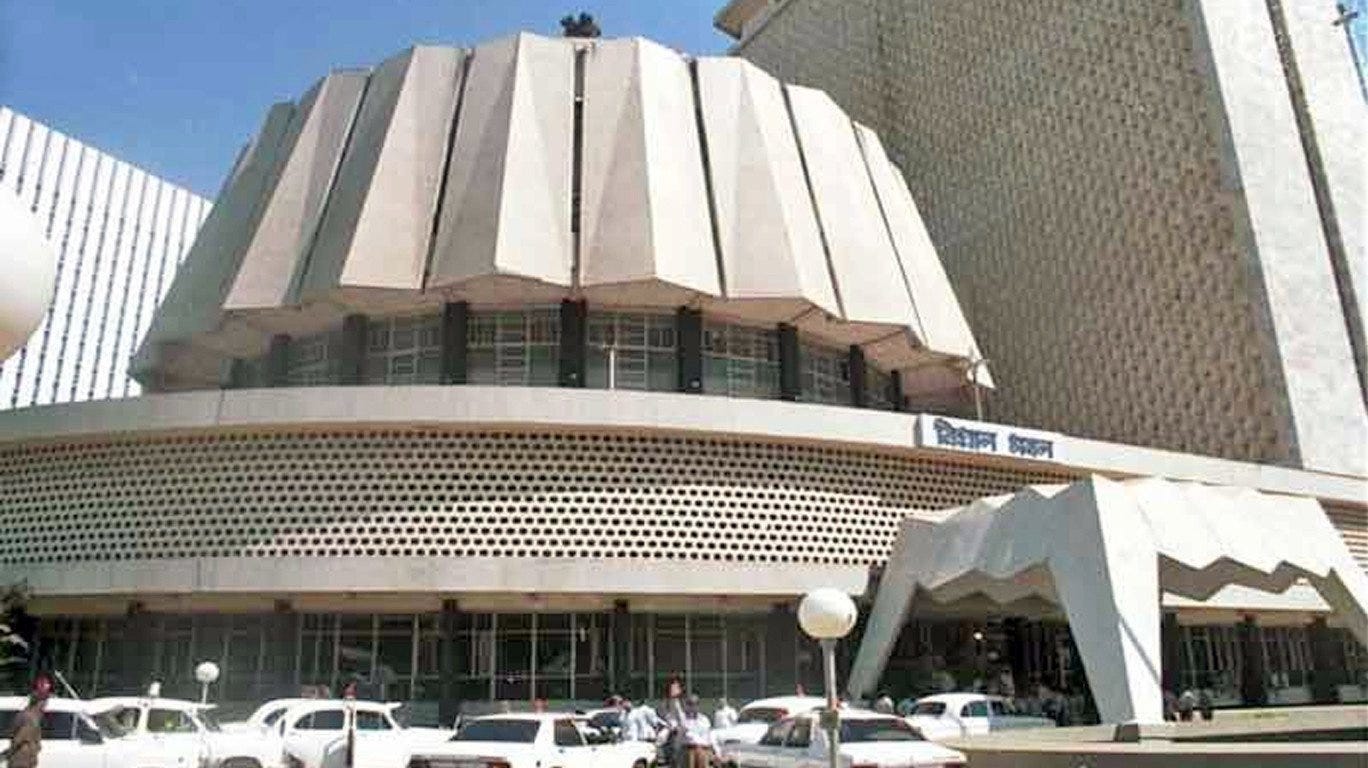
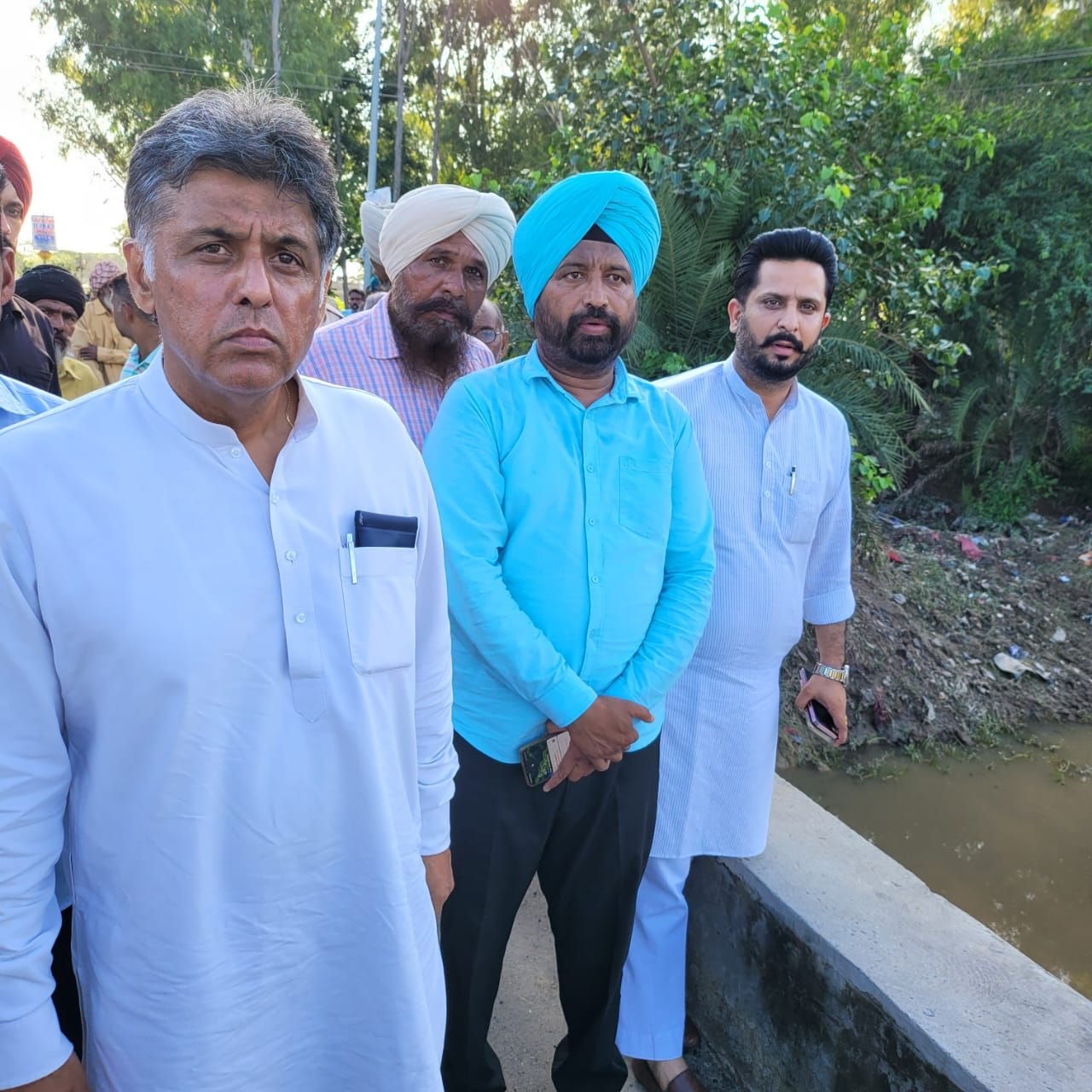
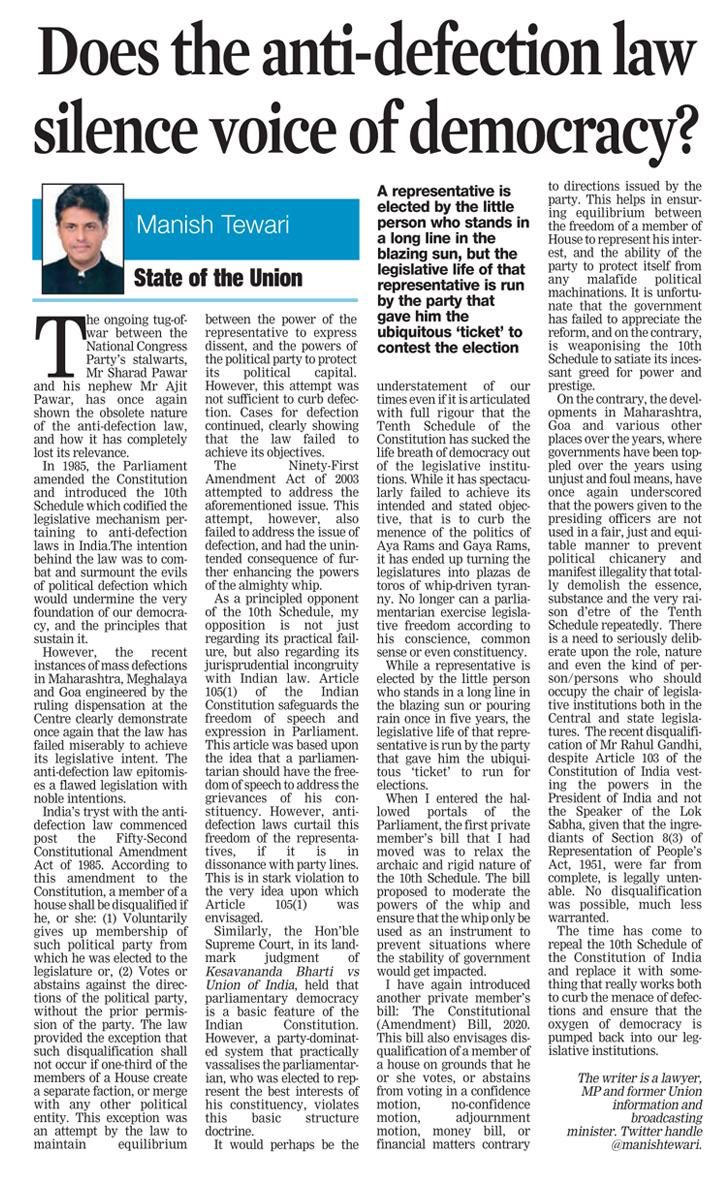
Really interesting. Just finished reading it (and learning a bit of the Hindi names of your political bodies 😹).
Even if Perú's political system is far simpler (we only have 33 millions of habitants, compared to India's 1400 millions, so we don't have internal states and our Parliament only has one house), we are currently suffering from massive defections and the forming of small parliamentary groups, and even small new parties.
Those groups and parties are motivated by personal interests (many of them of criminal nature) so the public opinion is strongly bent into the idea of introducing some kind of control or limitation for this phenomena.
Reading into India's past and present might help us avoid the pitfalls your people are now trying to fix.
Great info!
Law in statute and law in practice is different in our country. Law enforcers misuse the way it suits them. Laws are always enacted on the basis of public convenience and morality. Public convenience means suitability to the rulers and morality means nothing for political class, they come in the proviso of exempted class. This is the irony of our legal system and indian democracy
Dr Hssidhu ias retd